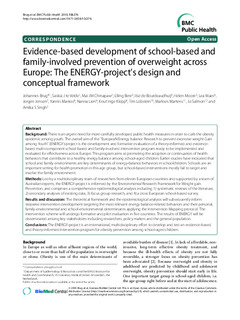| dc.contributor.author | Brug, Johannes | |
| dc.contributor.author | te Velde, Saskia J. | |
| dc.contributor.author | Chinapaw, Mai | |
| dc.contributor.author | Bere, Elling | |
| dc.contributor.author | De Bourdeaudhuij, Ilse | |
| dc.contributor.author | Moore, Helen | |
| dc.contributor.author | Maes, Lea | |
| dc.contributor.author | Jensen, Jorgen | |
| dc.contributor.author | Manios, Yannis | |
| dc.contributor.author | Lien, Nanna | |
| dc.contributor.author | Klepp, Knut-Inge | |
| dc.contributor.author | Lobstein, Tim | |
| dc.contributor.author | Martens, Marloes | |
| dc.contributor.author | Salmon, Jo | |
| dc.contributor.author | Singh, Amika S. | |
| dc.date.accessioned | 2010-07-22T11:01:00Z | |
| dc.date.available | 2010-07-22T11:01:00Z | |
| dc.date.issued | 2010 | |
| dc.identifier.citation | Brug, J., Velde, S. J. T., Chinapaw, M. J. M., Bere, E., de Bourdeaudhuij, I., Moore, H., . . . Singh, A. S. (2010). Evidence-based development of school-based and family-involved prevention of overweight across Europe: The ENERGY-project's design and conceptual framework. [Article]. Bmc Public Health, 10. doi: 10.1186/1471-2458-10-276 | en_US |
| dc.identifier.issn | 1471-2458 | |
| dc.identifier.uri | http://hdl.handle.net/11250/138985 | |
| dc.description | Published version of an article in the journal Bmc Public Health. Also available from the publisher: http://dx.doi.org/10.1186/1471-2458-10-276 | en_US |
| dc.description.abstract | Background: There is an urgent need for more carefully developed public health measures in order to curb the obesity epidemic among youth. The overall aim of the "EuropeaN Energy balance Research to prevent excessive weight Gain among Youth" (ENERGY)-project is the development and formative evaluation of a theory-informed and evidence-based multi-component school-based and family-involved intervention program ready to be implemented and evaluated for effectiveness across Europe. This program aims at promoting the adoption or continuation of health behaviors that contribute to a healthy energy balance among school-aged children. Earlier studies have indicated that school and family environments are key determinants of energy-balance behaviors in schoolchildren. Schools are an important setting for health promotion in this age group, but school-based interventions mostly fail to target and involve the family environment. Methods: Led by a multidisciplinary team of researchers from eleven European countries and supported by a team of Australian experts, the ENERGY-project is informed by the Environmental Research Framework for Weight gain Prevention, and comprises a comprehensive epidemiological analysis including 1) systematic reviews of the literature, 2) secondary analyses of existing data, 3) focus group research, and 4) a cross European school-based survey. Results and discussion: The theoretical framework and the epidemiological analysis will subsequently inform stepwise intervention development targeting the most relevant energy balance-related behaviors and their personal, family-environmental and school-environmental determinants applying the Intervention Mapping protocol. The intervention scheme will undergo formative and pilot evaluation in five countries. The results of ENERGY will be disseminated among key stakeholders including researchers, policy makers and the general population. Conclusions: The ENERGY-project is an international, multidisciplinary effort to develop and test an evidence-based and theory-informed intervention program for obesity prevention among school-aged children. | en_US |
| dc.language.iso | eng | en_US |
| dc.publisher | BMC | en_US |
| dc.title | Evidence-based development of school-based and family-involved prevention of overweight across Europe: The ENERGY-project's design and conceptual framework | en_US |
| dc.type | Journal article | en_US |
| dc.type | Peer reviewed | |
| dc.subject.nsi | VDP::Medical disciplines: 700::Health sciences: 800::Nutrition: 811 | en_US |
| dc.source.pagenumber | 276-286 | en_US |
| dc.source.volume | 10 | |
| dc.source.journal | BMC Public Health | |
